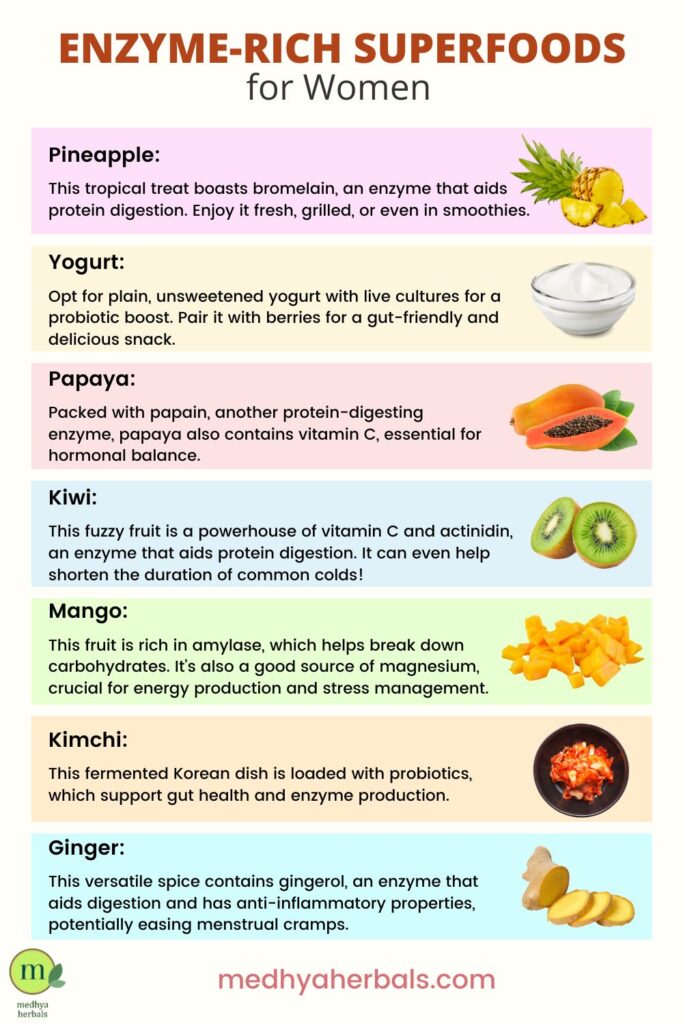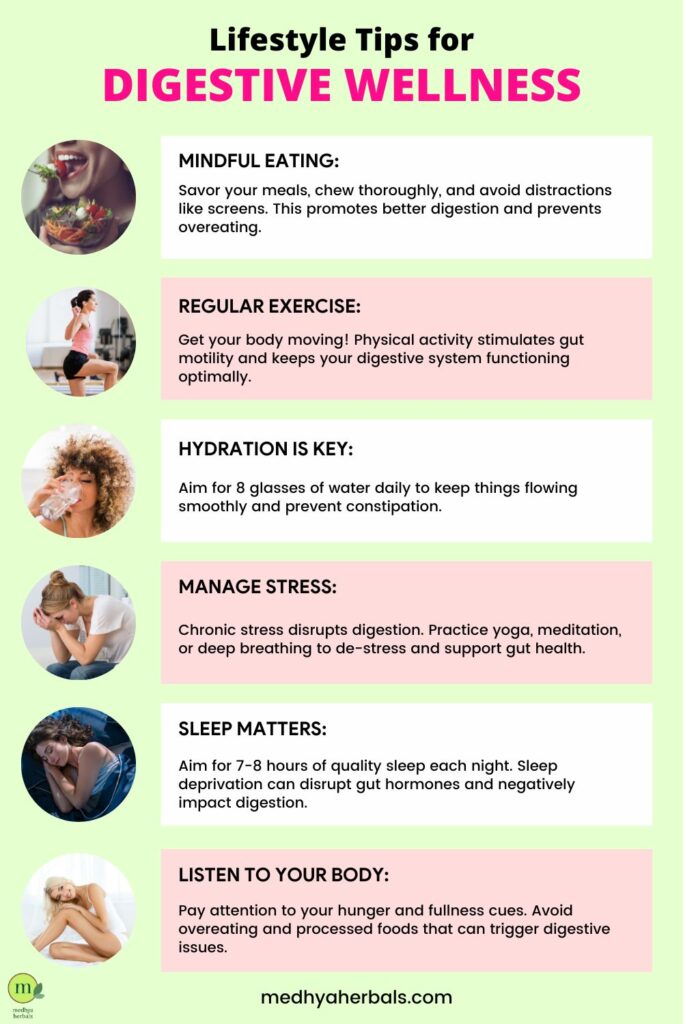Ever felt that uncomfortable feeling of bloating after a meal? Or perhaps you’ve experienced the frustration of constipation or the discomfort of indigestion. These common digestive issues can significantly impact our daily lives, affecting our energy levels, mood, and overall well-being.
While there are various approaches to managing these problems, many individuals are seeking natural solutions that address the root cause. Enter the fascinating world of natural digestive enzymes, powerful tools found in certain foods that can help your body break down food efficiently and improve your gut health.
In this article, we’ll delve into the science behind natural digestive enzymes, exploring how they work, the benefits they offer, and how you can easily incorporate them into your diet. We’ll also provide a comprehensive list of digestive enzyme foods to help you combat bloating, constipation, and indigestion naturally and effectively. Buckle up, as we embark on a journey to unlock the secrets of a happy and healthy gut!
Understanding Digestive Enzymes
Imagine your food as a complex puzzle – packed with essential nutrients, but locked away in large, indigestible molecules. That’s where digestive enzymes come in, acting as the skilled puzzle masters of your gut. These specialized proteins, produced by your pancreas, stomach, and small intestine, are like tiny molecular scissors, snipping and chopping food molecules into smaller, absorbable pieces.
By breaking down carbohydrates into sugars, proteins into amino acids, and fats into fatty acids, digestive enzymes unlock the hidden treasures within your meals, allowing your body to utilize them for energy, growth, and overall well-being. So, next time you take a bite, remember – it’s the silent symphony of digestive enzymes that transforms your food into the building blocks of a healthy you!
Types of Digestive Enzymes that our Body Needs
Each type plays a crucial role in breaking down specific food components:
- Amylase: Think of this as the starch specialist, targeting carbohydrates like bread, pasta, and rice. It snips them into sugars your body can readily use for energy.
- Protease: This protein powerhouse tackles the tough guys – proteins in meat, fish, and dairy. It breaks them down into amino acids, the building blocks for muscles, tissues, and hormones.
- Lipase: Fats are no match for this enzyme’s sharp wit. It breaks down fats and oils from nuts, seeds, and avocados into fatty acids, essential for energy storage and hormone production.
- Lactase: This specific enzyme helps digest lactose, the sugar found in milk and dairy products. Some people have lower lactase levels, leading to lactose intolerance.
These are just the main players, and there are many other specialized enzymes working tirelessly behind the scenes to ensure optimal digestion and nutrient absorption. Remember, a diverse and healthy gut microbiome can also contribute to natural enzyme production, further boosting your digestive power!
Why Enzymes Matter for your Gut Health?
Digestive enzymes are like tiny helpers in your gut, breaking down food into smaller, absorbable molecules. This allows your body to extract essential nutrients and keep you feeling energized and healthy.
- Reduced bloating and gas: By aiding in efficient food breakdown, these superfoods can alleviate discomfort and promote smoother digestion.
- Improved nutrient absorption: With enzymes doing their magic, your body can better absorb essential vitamins, minerals, and antioxidants from your diet.
- Enhanced energy levels: Efficient digestion means your body gets the nutrients it needs for optimal energy production, leaving you feeling revitalized.
- Stronger immune system: Many enzyme-rich foods are also packed with beneficial prebiotics and probiotics, which support a healthy gut microbiome, crucial for immunity.
- Balanced hormones: Some superfoods naturally contain compounds that can help regulate hormone levels, potentially easing symptoms like fatigue and mood swings.
Enzyme-Rich Superfoods for a Healthy Gut
Enzymes are essential for various physiological processes in the body, including digestion and metabolism. While many foods contain enzymes, some are particularly rich sources. Incorporating enzyme-rich superfoods into your diet can be beneficial for overall health, including for women. Here are some enzyme-rich superfoods that women may consider including in their diet:
- Pineapple: This tropical treat boasts bromelain, an enzyme that aids protein digestion. Enjoy it fresh, grilled, or even in smoothies.
- Papaya: Packed with papain, another protein-digesting enzyme, papaya also contains vitamin C, essential for hormonal balance.
- Mango: This vibrant fruit is rich in amylase, which helps break down carbohydrates. It’s also a good source of magnesium, crucial for energy production and stress management.
- Kiwi: This fuzzy fruit is a powerhouse of vitamin C and actinidin, an enzyme that aids protein digestion. It can even help shorten the duration of common colds!
- Kimchi: This fermented Korean dish is loaded with probiotics, which support gut health and enzyme production. Enjoy it as a side dish or condiment.
- Yogurt: Opt for plain, unsweetened yogurt with live cultures for a probiotic boost. Pair it with berries for a gut-friendly and delicious snack.
- Ginger: This versatile spice contains gingerol, an enzyme that aids digestion and has anti-inflammatory properties, potentially easing menstrual cramps.
Consistency is key! Regularly incorporating these enzyme-rich superfoods into your diet can significantly improve your digestion and overall well-being. So, listen to your body, explore these delicious options, and unleash your inner digestive powerhouse!

Incorporating Ayurvedic Principles into Your Diet
Unveiling a secret to holistic wellness lies in the ancient wisdom of Ayurveda. This time-tested system connects food to your unique body type (dosha) for optimal health. So, how do you incorporate Ayurveda into your diet? It’s not about strict rules, but about mindful choices that nourish your body and mind. Embrace fresh, seasonal produce, favor whole grains and legumes over processed options, and incorporate spices like ginger, turmeric, and cumin for their digestive and anti-inflammatory properties. Explore the warming qualities of ginger tea or cooling effects of cucumber raita – adjust your choices based on your dosha.
Lifestyle Tips for Digestive Wellness
Beyond food, your daily habits can have a significant impact on digestive wellness. Here are some key lifestyle tips to unlock your inner digestion:
- Mindful eating: Savor your meals, chew thoroughly, and avoid distractions like screens. This promotes better digestion and prevents overeating.
- Hydration is key: Aim for 8 glasses of water daily to keep things flowing smoothly and prevent constipation.
- Manage stress: Chronic stress disrupts digestion. Practice yoga, meditation, or deep breathing to de-stress and support gut health.
- Regular exercise: Get your body moving! Physical activity stimulates gut motility and keeps your digestive system functioning optimally.
- Sleep matters: Aim for 7-8 hours of quality sleep each night. Sleep deprivation can disrupt gut hormones and negatively impact digestion.
- Listen to your body: Pay attention to your hunger and fullness cues. Avoid overeating and processed foods that can trigger digestive issues.
By incorporating these tips and exploring natural digestive enzymes through food, you can empower your body to achieve optimal digestive health and feel your best!

Conclusion
We’ve explored the magic of natural digestive enzymes and how incorporating them through diet can transform your gut health. But remember, everyone’s digestive journey is unique. What works wonders for one might not be the perfect fit for another. That’s where the wisdom of Ayurveda comes in.
Finding lasting relief from digestive troubles can seem like an endless search. You might have tried countless remedies, only to find temporary fixes or frustrating side effects. But Ayurveda offers a different approach – one that focuses on the root cause of your imbalances, not just the symptoms.
Remember, you’re not alone on this journey. Medhya Herbals is here to empower you with the knowledge and tools you need to achieve optimal digestive health – naturally. Schedule your consultation today and take the first step towards a life free from digestive woes. Together, let’s unlock the power of food and Ayurveda for a happier, healthier you!
FAQ
Is apple cider vinegar a digestive enzyme?
No, apple cider vinegar itself is not a digestive enzyme. It does contain acetic acid, which can play a role in digestion by creating a more acidic environment in the stomach. This acidity may help break down certain foods, particularly protein. However, it’s important to note that this effect is different from the specific actions of digestive enzymes, which are complex molecules responsible for targeting and breaking down various components of food like carbohydrates, fats, and proteins. Additionally, research on the effectiveness of apple cider vinegar for improving digestion is limited and inconclusive. While it may offer some benefits for certain individuals, it’s not a substitute for a balanced diet rich in natural digestive enzymes.
How can I restore my digestive enzymes naturally?
Although your body naturally produces digestive enzymes, certain lifestyle changes can support their optimal function. Focus on a balanced, whole-food diet rich in fruits, vegetables, and whole grains. Chew your food thoroughly, manage stress, stay hydrated, and limit processed foods. Consider fermented foods like kefir and kimchi, which may indirectly support enzyme production through a healthy gut microbiome. Remember, these are general tips, and consulting a healthcare professional is recommended for personalized guidance if digestive issues persist.
Is it OK to take digestive enzymes every day?
Daily digestive enzyme use might be safe for some, but consulting a healthcare professional is crucial before starting them. They can assess your needs, recommend proper dosage, address potential side effects like bloating, and ensure enzyme use doesn’t interact with medications or worsen existing conditions. Always prioritize professional guidance before starting any new supplement.
What are the best natural enzymes for digestion?
Rather than focusing on individual “best” enzymes, it’s crucial to remember that different enzymes target specific nutrients. Ideally, you should consume a variety of foods rich in various enzymes to support the breakdown of a balanced diet. Some notable examples include bromelain (protein breakdown in pineapple), papain (protein digestion in papaya), amylase (carbohydrate digestion in fruits and vegetables), lipase (fat breakdown in avocados), and lactase (lactose digestion in yogurt and kefir). By incorporating a diverse range of these enzyme-rich foods into your diet, you can significantly improve your overall digestive health and potentially alleviate common discomforts.

